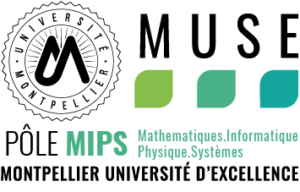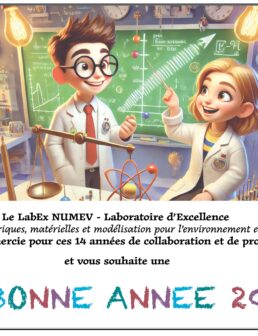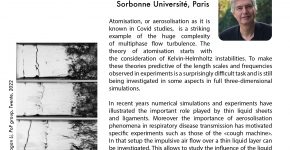Digital and hardware solutions for the environmental and life sciences (NUMEV)

NUMEV is the University of Montpellier’s Laboratory of Excellence (LabEx), focusing on the interaction between computer and engineering sciences, and life and environmental sciences, to foster the emergence of an interdisciplinary cluster with international visibility.
The research-training-transfer dynamics of LabEx NUMEV contribute to major scientific, technical and economic developments at the interfaces of the MIPS (Mathematics, Informatics, Physics, Systems) scientific community and the life and environmental sciences (agronomy, biodiversity, biology, ecology, health).
LabEx NUMEV participates and strongly supports the Montpellier Cluster-IA initiative.
NUMEV is developing, for instance, research and scientific animation projects concerning Artificial Intelligence in various fields inspired by life and environmental sciences (detection, data and knowledge extraction, surgical robotics, image and signal analysis, computation and modelling, etc.).
LabEx NUMEV brings together over 200 scientists in 8 research units, under the supervision of 5 partner institutions (UM, CNRS, INRAE, Inria, SupAgro).

LabEx NUMEV has been funded in 2011 by the Agence Nationale de la Recherche (ANR) as part of the Programme Investissements d’Avenir (PIA).
With an initial budget of 8 million € for 10 years, LabEx NUMEV was renewed in 2019 with a new budget of about 4 million € for 5 years (2020-2024).
More about NUMEV
NUMEV seeks to harmonize hard and computational sciences approaches to life and environmental sciences and pave the way for emerging interdisciplinary groups with an international profile. Developing the Research‐Education‐Transfer dynamics, leading creativity and innovation, will contribute to nowadays main scientific, technical, and economic challenges. In this view, scientific communities are deeply involved in developing their research on complex and multiscale natural or man-made systems. A number of specific research actions should be undertaken to: (i) monitor, quantify and model system properties; (ii) represent, plan and build system knowledge; (iii) control and predict normal and anomalous behaviours; (iv) provide solutions to recognize, face and answer emerging problems; (v) imagine, project and build new concepts and systems.
The 4 major interdisciplinary challenges related to life and environmental sciences define the main NUMEV scientific objectives :
- Observing, Characterizing, Modeling systems.
- Extracting and Representing data.
- Developing Computational /Algorithmic Methods for large data sets.
- Conceiving Computational & Mathematical Representations of systems.
The expected outcomes of the NUMEV project are:
- to increase the excellence and international visibility of research within its laboratories;
- to ensure the excellence of sciences and education (especially at the PhD and master levels)
- to create new synergies between research communities and economic world.
NUMEV stands at the crossroads of multi-disciplinary activities and skills, a position that makes it ideally suited to provide a powerful and effective development and structuring tool to MIPS (Mathematics – Informatics – Physics – Systems) scientific community.

Follow us on Youtube : https://www.youtube.com/@labexnumev








